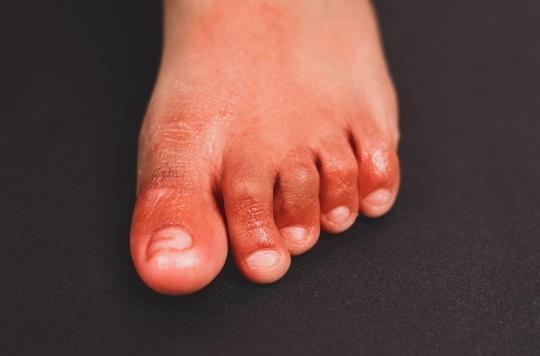Purplish lesions on the toes and feet of patients, long thought to be a symptom of Covid-19 infection, are actually a sign of a natural immune reaction against the virus.

- A strong type I interferon response, of which pseudo-frostbite is the clinical expression, could promote rapid clearance of the virus, avoiding both disease and seroconversion.
- This interferon is a group of antiviral proteins whose very strong activation would provide a natural barrier against SARS-CoV-2.
- The researchers estimate that the number of people who benefit from this natural protection is probably small.
Turnaround. From the start of the pandemic, skin redness was observed in some Covid-19 patients. Studies have since been conducted and concluded that they are a sign of infection with the virus. But these frostbites could actually be a sign of innate resistance to SARS-CoV-2. In any case, this is the hypothesis of two Swiss researchers from the dermatology department at the Center hospitalier universitaire vaudois (CHUV) who investigated the subject and presented their results in last week’s edition of the Swiss medical journal (RMS).
Covid toes, the clinical sign of the activation of antiviral proteins
First presented as a potential symptom of a Covid-19 infection, Covid toes are all the more intriguing as the majority of cases do not show symptoms of Covid-19 or PCR or positive serology, despite likely exposure to SARS-CoV-2. A study dated April 29 and published in the British Journal of Dermatology has also found that skin inflammation in the feet and toes was the only clinical symptom of exposure to the virus in 21% of the 337,000 patients observed.
These skin reactions would in fact be a sign of a natural immunity against the virus in the patients concerned. “Current data suggests that these individuals are predisposed to induce robust innate immunity against SARS-CoV-2, making them resistant to infection.the researchers concluded. A strong type I interferon response, of which pseudo-frostbite is the clinical expression, could promote rapid clearance of the virus, preventing both disease and seroconversion..” This interferon is a group of antiviral proteins whose very strong activation would provide a natural barrier against SARS-CoV-2.
A very small proportion of the population concerned
The researchers estimate that the number of people who benefit from this natural protection is probably small. “It is difficult to give a precise figure since many patients with pseudo-frostbite do not consult. But we can estimate that it should be between 0.05% and 0.5%”, advances Dr. Ahmad Yatim of the dermatology department of the CHUV and author of the study.
Further research is needed to better understand this protective mechanism. “The genetic and molecular mechanisms underlying this natural resistance to SARS-CoV-2 remain to be elucidated.”, concede the authors of the scientific article. This discovery opens the hope of “develop therapeutic strategies with the aim of inducing effective antiviral immunity in patients who do not naturally benefit from it”, conclude the scientists.

.















